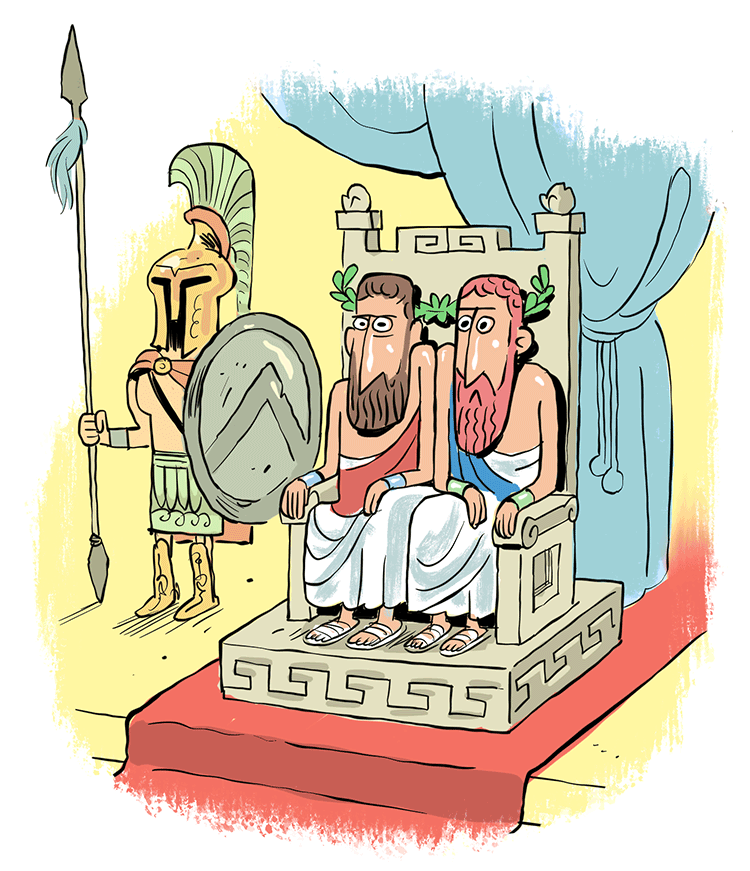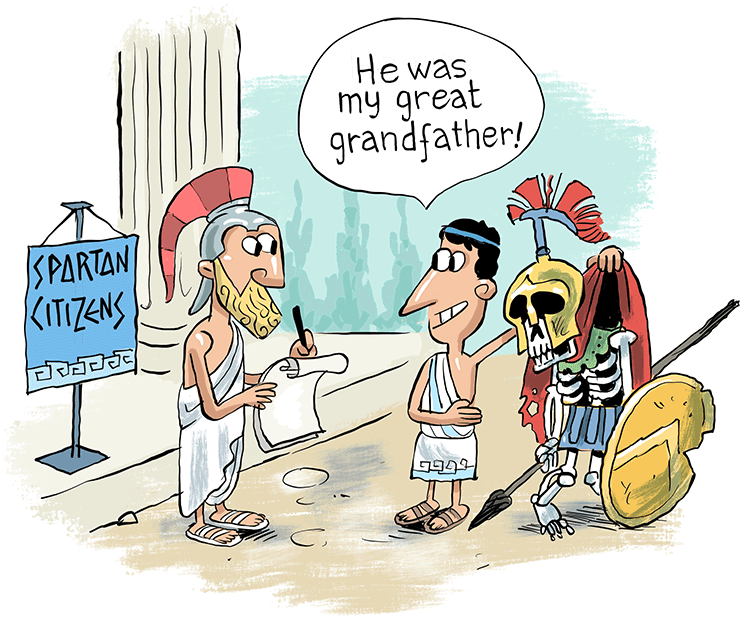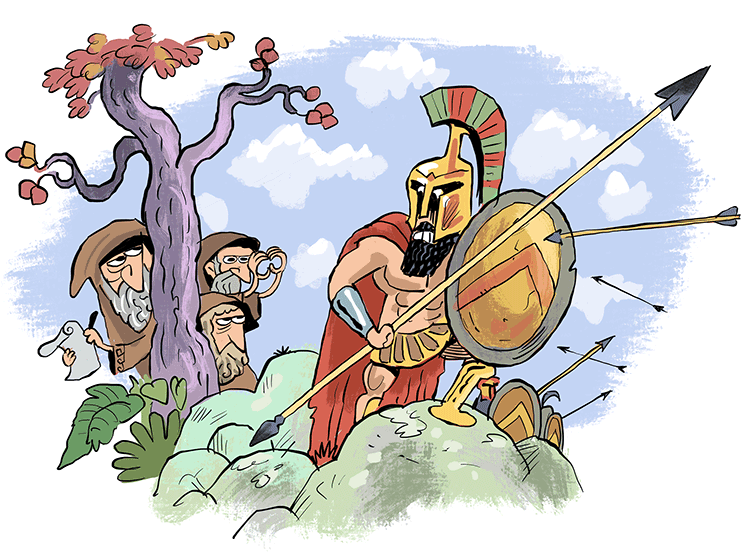Between inventing democracy, advancing philosophy, and discovering key mathematical principles still in use today, it’s easy to see why many people saw the ancient Greeks as “ahead of their times.”
However, when we think of these things, we’re usually thinking of Athens.
There, democracy flourished for over four hundred years in a world where kings and despots had most of the power.
Elsewhere, power was in the hands of the few, and regular citizens had little to no say in the affairs of the state.
Such was the case in ancient Sparta. Made famous by its powerful army and heavy emphasis on personal discipline, Sparta was an oligarchy. This means power belonged to a very small group of people.
The Spartans took this even further, placing strict limitations on who could weigh in on Spartan politics.
But who were those people? And what role did they play in Spartan government? Was Sparta the oligarchy of all the oligarchies?

Spartan Kings
At the very top of the Spartan government were its two kings. Yes, you read that right — two.
This rather unusual arrangement came from the early days of Spartan civilization. Five towns, all ruled by separate families, united to form one polis, the Greek word for city.
Unable to decide who would rule this new city, they compromised and decided to install two kings, one from each of the two most powerful families, the Agiads and Eurypontids.
To help maintain their status, the king was given the largest plot of land out of any other Spartan citizen. This made them the wealthiest members of society. But they were still expected to adhere to Sparta’s strict social norms, mainly self-discipline and being serious.
The primary duties of the kings were leading the Spartan army into war. Depending on the nature of the conflict, one king might stay in Sparta while the other would campaign. But in the case of larger wars, both kings might head to war, each commanding a different army.
Beyond that, their main duties included overseeing certain religious ceremonies and working with the priests. Another big task was serving on the gerousia.
The Gerousia
While the kings were considered to be at the top of Spartan government, they actually held very little political power. That resided mostly with the gerousia. This was a group of 30 people total, 28 elders elected by the Assembly, and the two kings.
This group was responsible for making up the laws and other policies of the Spartan state. But they didn’t have absolute power. The best they could do was submit proposals to the Spartan Assembly.

The Spartan Assembly
All Spartan citizens belonged to the Assembly. But this was a rather small group. To be a Spartan citizen, you had to trace your ancestry to the original Spartans. And you also had to graduate from Sparta’s strict military school. But if you did, you could participate in the Spartan state.
The Assembly met roughly once a month. At the meetings, the members debated and voted on the proposals drawn up by the gerousia.
In this sense, some parts of Spartan government looked a little bit like Athenian democracy. But given the strict requirements of citizenship, it’s hard to really call Spartan government by that name.
Yes, there was voting. But less than one percent of the whole population was voting, which isn’t really democratic at all.

Ephors: The Accusers
In addition to the gerousia, the ephors — the accusers — managed Sparta’s day-to-day operations.
The ephors got their name because their job was to check on the other areas of Spartan government, mainly the kings. If they saw something wrong, they could “accuse” these officials of failing to carry out their duty. This could lead to an inquiry and a potential removal from office.
The ephors were also the ones who decided when Sparta would go to war, a pretty important job in a society where pretty much every institution supported the military.
There were five ephors in total, and they served just one year terms. But, over time, the ephors got more and more powerful.
One of the ways they did this was by accompanying kings to war. This would allow them to see first-hand the decisions being made on the battlefields, and if they didn’t like what they saw, they could send the kings back to Sparta.
This made it so that the kings had to do whatever pleased the ephors. By the time Sparta fell, the kings actually had very little power of their own. Instead, they were almost completely beholden to the ephors.
The Peloponnesian League
In general, Spartan government was most concerned with what was going on in and around Sparta.
Throughout the Classical Era (c. 600 – c. 200 BC), Sparta did not have much interest in what was going on outside the Peloponnese, the peninsula where Sparta is located. But the Spartan government did associate with other Greek city-states, mainly through its participation in the Peloponnesian League.
No, this wasn’t a soccer league. Instead, it was a collection of city-states also on the Peloponnese. The big names on this team were Sparta, Corinth, and Argos.
This city-states worked together to provide for their common defense, though participation in the League was voluntary. And things changed often.
For example, Sparta and Argos hated one another, and so they would cycle between being allies as part of the League and enemies at war.
Having Corinth as an ally was important since its location — the isthmus of Corinth — was connected the Peloponnese with the rest of mainland Greece. It was an important strategic location. Sparta knew offending Corinth would allow its enemies to cause all sorts of problems on the Peloponnese.
Typically, the Spartan assembly would send envoys to the meetings of the city-states that made up the Peloponnesian League. For more important matters, they might send one of their kings.
They would go with specific mandates. So, if negotiations went a different way, they would have to report back to the assembly for approval. This is similar to how modern negotiators must bring their treaty terms back to their home governments before signing.
The Oligarchy of all the Oligarchies
Spartan government was a textbook example of an oligarchy. First, only Spartan citizens — an extremely small segment of the population — had any power. But an even smaller group made most of the decision.
So, while some elements of Spartan government might look democratic, they were anything but.
Yet this approach was effective, if the goal was to endure for six centuries and rise to be one of the most powerful and well-respected city-states in the entire ancient world.
Written by Matthew Jones
Illustrated by Jean Galvao
